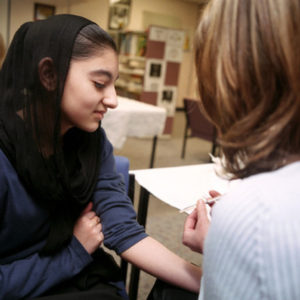Immunisation gaps among refugees – report
Australia lacks a clear and foolproof system to ensure refugees are immunised against preventable diseases, a new report says.
Australia has one of the most comprehensive immunisation programs in the world.
But many of the thousands of refugees who arrive each year are under-immunised before they resettle and have no records of which vaccines they have been given.
A report by University of New South Wales researchers has found inconsistencies between states and territories and poor integration of services prompting calls for a national strategy to address what the report says is under-immunisation among the refugees.
 The study’s lead author, Dr Abela Mahimbo, says a lack of data means it is hard to determine exactly how many are missing out.
The study’s lead author, Dr Abela Mahimbo, says a lack of data means it is hard to determine exactly how many are missing out.
“It’s actually difficult to say at what level nationally the coverage is at, but, according to small studies, there seems to be a pattern where refugees are under-immunised for a lot of vaccinations given in Australia,” Dr Mahimbo said.
In the past decade, more than half of Australia’s refugees have come from Iraq, Sudan, Myanmar and Afghanistan.
Unrest in those countries disrupts health services, making them more susceptible to vaccine-preventable diseases.
Dr Mahimbo said that even if people have been vaccinated in another county before leaving, it is unlikely the schedule met Australian standards.
“Recent refugees that are coming from Syria have been shown to have very good immunisations, but the fact that their schedule is not as comprehensive as that of Australia reflects the need to ensure they are immunised adequately to Australian standards,” she said.
Her research suggests mainstream health services and specialised resettlement services need to work together better.
“There was just this lack of integration and coordination between these groups, leading to gaps and people just slipping through the cracks,” Dr Mohimbo said.
The report found a need for a unified national approach to lift immunisation rates among refugees.
At the moment, only New South Wales, the Northern Territory and Western Australia have developed refugee-specific policies.
In the Australian Capital Territory and Victoria, refugees are recognised as an at-risk group but there are no policies in place to address the issue.
A refugee settlement worker in Melbourne told iMPACT that the federal government had recently funded a program to give refugee children catch-up immunisations for children.
“The program is working well but there are still many adult refugees who may not be immunised,” the worker said.
She said that one problem was that vaccinations were administered by GPs, in community health centres and in refugee centres and not all of any of these groups had the capacity to keep immunisation records.
“It’s hit and miss. Some doctors and health centres give the full suite of inoculations and keep records, others just give some vaccinations and some don’t bother to keep records,” she said.
“So we don’t know who is immunised against what,” the worker said.
The Royal Australian College of General Practitioners says the issue is not easy to fix.
“We need to make sure that the catch-up programs are administered consistently in all states and territories,” said college president Dr Bastian Seidel.
Laurie Nowell
AMES Australia Senior Journalist












